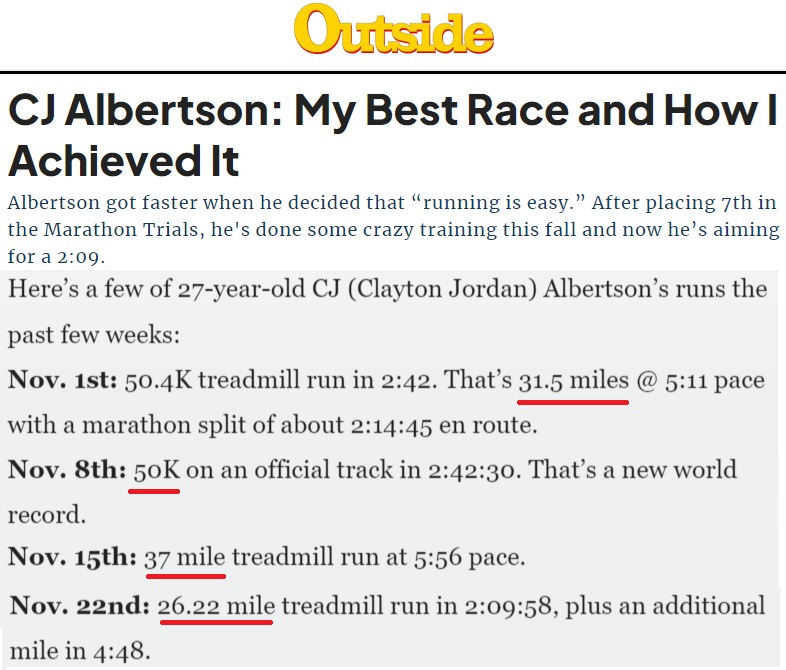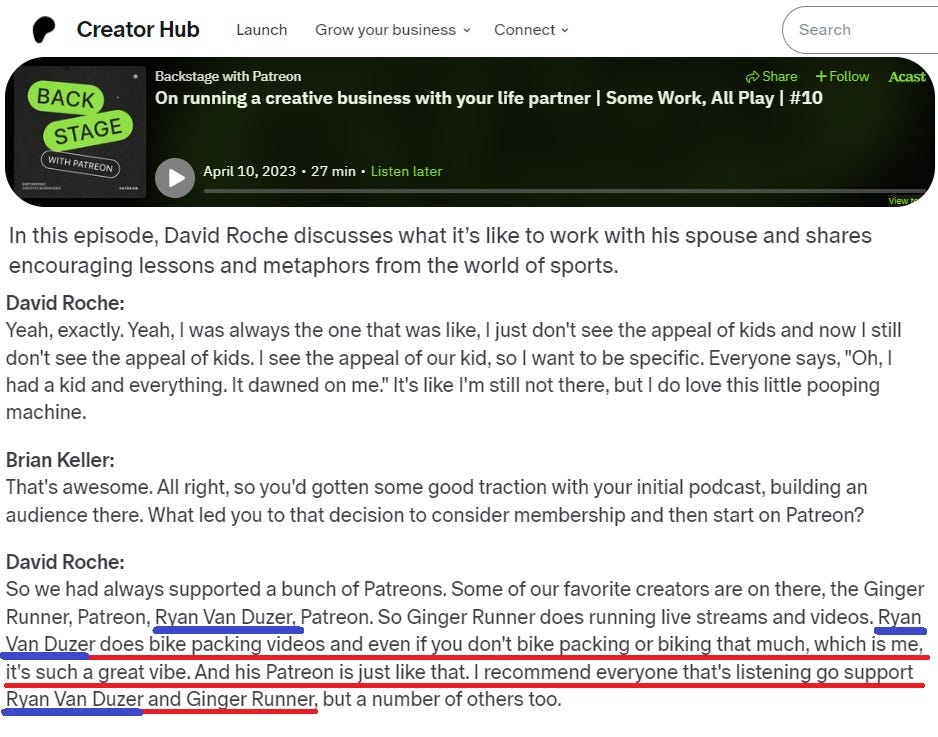David Roche et al. continue scaling the quality of Trail Runner's advice to the composition and expectations of the S.W.A.P. community (GUEST ANALYSIS)
Hi! Allow me to start this introduction of my best and smartest friend with a few kind words about myself
“This piece, ‘It's OK to Ditch your Training Plan,’ is great per Trail Runner standards,” opined a longtime Beck of the Pack reader and Western States 100-Mile Endurance Run completer in a recent e-mail. Like an unfortunate gaggle of others, this person has, without his or her own explicit permission, become morbidly captivated by the literary and lay-science Hindenburg that Trail Runner has become over the past four years, give or take.
The primary vandal in the current editorial regime in terms of producing sheer unreadable chum that would be incoherent, impractical, and inaccurate even if reframed in syntactically unimpeachable and stylistically Churchillian prose is David Roche. The captivated party has contributed over the years to some of my reviews of Roche’s output.
What follows is this person’s and my combined review of a December 5 Trail Runner article not by Roche but by Jason Fitzgerald. Material in quote blocks is from the article itself, while oomphasized bits of text represent my own observations. Below this analysis bonus content reserved for masochists and people with strangely fruity breath.
I’m a running coach that makes his living by writing training plans and encouraging runners to think more strategically about their training. I typically dislike “big swings” or “hero workouts,” and instead, focus on gradual improvement over time. But today, I want to forget all that and advise you to throw caution to the wind and take a chance on yourself. After coaching for over a decade, I’ve discovered that runners love their training plans.
So you're a coach, and you've discovered that runners like training plans? WOW!!!
Over-distance long runs are typically longer than 20 miles (rarely advised for marathoners) but often 30-50 miles in length for 100-mile ultra runners. These distances are usually not a great idea for most runners as they compromise future training, have a high injury risk, and aren’t specific to their goal races. But for ultra runners, those concerns can be forgotten due to the specific demands of their event. Since their goal race distance is so long, they must periodically run for far longer than 20 miles.
So I don't have to worry about getting injured running longer runs if I'm training for an ultra? If I train for a 5K, can I run intense 400 intervals w/o getting injured?
Damn, this person is snarky. Keeping things civil but still nicely combative, I disagree with the author that runs longer than 20 miles are rarely advised for “marathoners,” since this is a huge, fuzzy class of individuals, some of whom are pure waddler-prevaricators.
There is nothing magical about deciding what you’re putting your body through is “training for an ultra” instead of “training for a marathon.” Therefore, if it makes sense from an event-specificity standpoint for someone training for a 100K or 100-mile race to run as far as 50 miles in training, why couldn’t a high-mileage marathoner benefit from running 25 or even 30 miles in preparation for a 26.2-mile race instead of stopping at around three-fourths of that?
For example, if you were comfortable running 40-50 miles per week about six months ago, but just took two months off from running entirely, you do not need to build your mileage according to the 10 Percent Rule. You may run 15 miles during your first week back to running, 25 miles in your second week, and 30 miles in your third week. This mileage progression results in an increase of 66 percent during the second week and 20 percent the third week. This clearly violates the 10 Percent Rule, but nonetheless represents a manageable workload for this athlete.
I agree with the above, unless the person has been sick, or the person has lost or gained significant weight. But why clarify anything?
WHOA. This place needs a Sarcasm Patrol! That said, according to the corporate running media, I also agree that the 10-percent “rule” is self-evidently nothing more than basic “better to be safe than sorry” advice. The historical hiccup here is that distance running is awash in both numbers-obsessed de facto autists and luxury-class people with ample time for engaging in unresolvable Internet wars.
Back-to-back long runs are exactly what they sound like: two long runs done on back-to-back days (usually a Saturday and a Sunday). This heroic weekend adventure is also typically reserved for ultramarathoners due to the demands of the events they’re training to complete. In these scenarios, we would not attempt to gradually get used to this stress.
WTF? I ran some back-to-back long runs, though in general, they weren't my jam—I preferred the 25- to 35-mile long runs, and not back-to-back with anything. Most ultras are run continuously, so for me, it made more sense to focus on the longer run. For others, a 22-22 weekend double may be a better option than a single 35 to 50.
Also, any decent ultrarunner does get used to the stress of back-to-back long runs. I'm pretty typical in some ways -- before I ran ultras, I ran 60- to 70-mile weeks in marathon training. It was typical to have a 12 then a 10, or an 8 and 15. That IS "gradually getting used to the stress." Before I attempted a 20-20, I did a 20-10, then a 20-15, etc., but the point is that I didn't just throw 20-20 back-to-back long runs onto my body out of nowhere.
During my first year of running, I ran a PR in nearly every single race I ran from the mile, to two miles, to the 5K. If you’re consistent with training, a long string of PR’s in your first few years should be expected.
Me too! LieToya too! It's easy to run PRs (not PR's, Zoe) when you're running distances for the FIRST TIME.
Don’t Be Too Cautious
Running has a high injury rate, so these strategies should be used sparingly and conscientiously, ideally under the direction of a certified running coach. Logical progressions of volume and intensity and realistic training always win out over dramatic progressions and big swings in intensity.
However, I believe in everything in moderation (including moderation). There are unique instances when we can abandon the logic of our training plan, bet on ourselves, and take a chance on our ability. Sometimes, we have to take a risk to see what we’re truly capable of achieving.
So, should I be cautious or not? Shouldn't coaching involve—oh, I don't know—smart RISK MANAGEMENT?
Posts like these would be incomplete without at least a brief tribute to the latest work of Roche himself. Roche starts a November 28 article, “The Wild, Uncertain Science of Post-Exercise Ketones,” with the following paragraph (oomphases again mine):
I heard about athletes supplementing with ketones sometime in the mid-2010s. A company reached out, promising the next big breakthrough in endurance performance from this liquid supplement composed of a molecule naturally produced in the body from the breakdown of free fatty acids. They told me that the top cyclists in the world were already using ketones and that it was destined to take over running, too. They sent a few boxes…and they collected dust in the pantry. It felt like a biohack, and I wasn’t comfortable with it.
On the writing itself, it’s a bad idea to use the same pronoun three times in short order to refer to unspecified and varying entities. The first “they” up there appears to refer to “a company,” so replacing this with “the company” both adds more information and avoids a low-grade subject-verb mismatch.
The second “they” still refers to the unnamed company, but instead of simply writing “They sent a few boxes, which collected dust in the pantry”—even retaining the ellipsis to contrive an instant of drama if desired—Roche once again went out of his way to squat down on his goofy haunches and fart bare-assed into his readers’ visual fields by adding a “they” suggesting that listless or dead ketone-vendors are gathering cobwebs in the Roche family larder.
In terms of the content, the idea that liquid ketone supplements are “composed of a molecule,” even allowing for the fact that you’re almost assured of getting more than four carbon atoms per bottle or dust-gathering box, these supplements usually contain two different kinds of ketones, acetoacetate and beta-hydroxybutyrate (although chiefly the latter compound for reasons, it seems. of product stability). A third naturally produced ketone, acetone, is especially toxic when it accumulates in the body (as when it is drunk in the form of nail-polish remover) and is excreted via the lungs or urinary tract. Outside the liver, where the two metabolically useful ketones are made, beta-hydroxybutyrate is converted to acetoacetate, which is converted to the highly energetically versatile molecule acetyl coenzyme A.
Roche doesn’t mention the names of either of these nifty ketones once in his piece despite using the general terms “ketone” or “ketones” around sixty times, preferring instead to mask his thunderous cluelessness with the usual excited, empty squawking about the published research supposedly bolstering his usually mysterious point. When he writes, “I can’t emphasize enough how great this review article is,” he’s technically not lying, because he never has any idea whether a given study is great or not. This would require both understanding and reading beyond abstracts.
But the best part of the paragraph is “It felt like a biohack, and I wasn’t comfortable with it.” This is a monumentally selective burst of ethical rigidity given that Roche just accepted—or engulfed—someone fresh off a doping-related suspension into his stable of spavined and lugubrious human ponies.
I also have a teaser for Boulder-area readers. In working on a post about last month’s city-council election and the gratifying failure of a capering idiot named Waylon Lewis to win a seat on this august body of floor-humping self-dealers, I came across an endorsement of Lewis—who by many accounts is far worse than just a Fauciphilic libtard—published in the Daily Camera shortly before the election and posted to Facebook by Lewis himself.
I thought to myself, “Now what kind of douchebag has to mention he’s a marathon runner in a letter of endorsement for a political candidate? At the beginning, no less?” It seemed at least possible that this Boulder-based jogger might have ties to David Roche based on his casual self-stroking alone. Now I feel like an ass for imagining for even an instant that any other outcome was possible.
I didn’t read far into the transcript of the associated podcast, but I read far enough to start laughing.
Basically we just try to come on there with enthusiasm every week for life, for running, which is a small part of it, and the science aspect of it since Megan is an MD PhD at Stanford and I have a science background as well, so it's just so fun to get to chat about things that sometimes blend the high performance running side and sometimes we're talking about random things about politics or really important things like inclusion in sports and transgender athlete rights. And so basically we just always viewed a podcast as a chance to be our true authentic selves to anyone who wants to listen. And then Patreon as ended up being a wonderful extension of that.
These people. Happy all things Friday to every to everyone out there, both these theys and those theys, even the Internet’s unwieldy complement of daft and dodgy dissemblers. We need you to be just the way you are.





